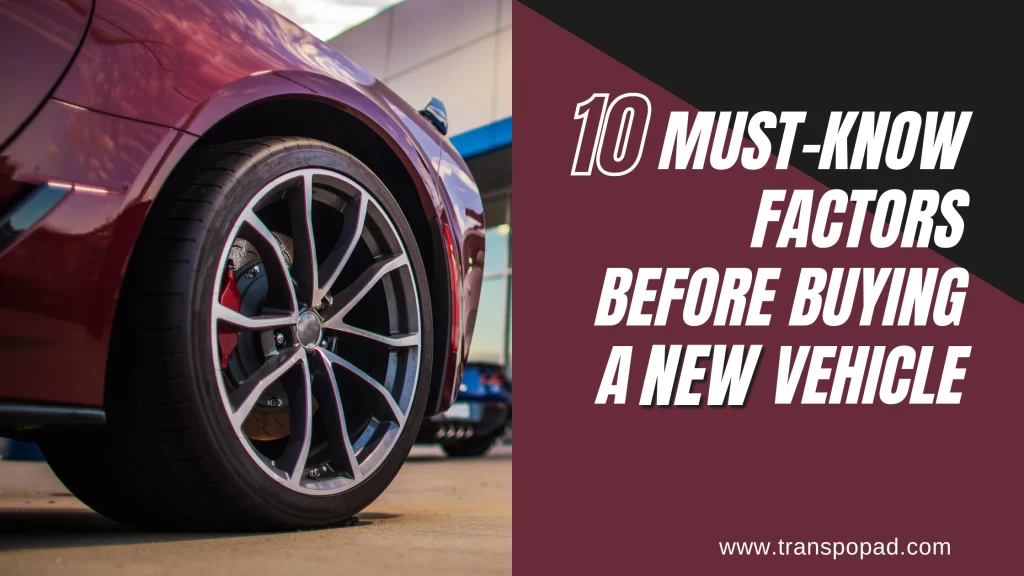
Are you in the market for a new vehicle? Whether it’s your first car or an upgrade from your current one, purchasing a new vehicle is an exciting but significant decision. It’s crucial to make an informed choice that aligns with your needs and budget. In this article, we’ll explore ten must-know factors to consider before buying a new vehicle to ensure a smooth and satisfying buying experience.
Table of Contents
- Research the Market
- Determine Your Budget
- Choose the Right Vehicle Type
- Consider Fuel Efficiency
- Evaluate Safety Features
- Check Reliability and Reviews
- Assess Insurance Costs
- Test Drive and Inspect
- Negotiate the Price
- Consider Financing Options
- Review the Warranty
- Evaluate Resale Value
- Conclusion
- FAQs (Frequently Asked Questions)
1. Research the Market
Before diving into the sea of car dealerships, do thorough market research. Identify the types of vehicles that suit your lifestyle and needs. Consider factors such as the number of passengers, cargo space requirements, and intended usage. Research different brands and models, compare prices, and read customer reviews to gain insights into their performance and reliability.
2. Determine Your Budget
Setting a clear budget is essential when purchasing a new vehicle. Consider not just the initial purchase price but also ongoing costs such as insurance, fuel, and maintenance. Be realistic about your financial situation and avoid stretching your budget too thin.
3. Choose the Right Vehicle Type
Based on your research and requirements, narrow down your options to a few vehicle types that best suit your needs. Decide whether you need a sedan, SUV, truck, or any other type of vehicle that aligns with your lifestyle.
4. Consider Fuel Efficiency
With rising fuel prices, fuel efficiency is a crucial factor to consider. Opting for a vehicle with excellent gas mileage can save you money in the long run and also contribute to a greener environment.
5. Evaluate Safety Features
Safety should be a top priority when buying a new vehicle. Look for features like airbags, antilock brakes, stability control, and advanced driver-assistance systems (ADAS). These features can significantly reduce the risk of accidents and protect you and your passengers.
6. Check Reliability and Reviews
Reliability is an essential aspect to consider for the long-term satisfaction of owning a vehicle. Check reliability ratings and reviews from reputable sources to ensure you invest in a vehicle that will stand the test of time.
7. Assess Insurance Costs
Before finalizing your decision, obtain insurance quotes for the shortlisted vehicles. Insurance costs can vary significantly based on the make and model, so this step will help you anticipate ongoing expenses.
8. Test Drive and Inspect
Always test drive the vehicles you are interested in to get a feel for their handling, comfort, and driving experience. Additionally, inspect the vehicle thoroughly for any defects or signs of wear.
9. Negotiate the Price
Don’t be afraid to negotiate the price with the dealer. Armed with your research, you can confidently discuss the fair market value and get the best possible deal.
10. Consider Financing Options
If you require financing, explore various options and find the one that offers the most favorable terms. Compare interest rates, loan periods, and down payment requirements.
11. Review the Warranty
Understanding the warranty coverage is crucial, as it can save you from unexpected repair costs. Review the details of the warranty and any additional coverage options offered.
12. Don’t Forget About Maintenance Costs
Regular maintenance is essential to keep your new vehicle running smoothly. Factor in the maintenance costs and schedules of the vehicles you’re considering.
13. Evaluate Resale Value
Even if you plan to keep the vehicle for an extended period, it’s essential to consider its resale value. Opt for a vehicle with a good resale value to maximize returns in the future.
Conclusion
In conclusion, buying a new vehicle is a significant investment that requires careful consideration. By researching the market, determining your budget, evaluating safety features, and checking reliability, you can make an informed decision that aligns with your needs and preferences. Remember to negotiate the price, consider financing options, and review the warranty and maintenance costs to ensure a smooth buying experience. With these ten must-know factors in mind, you’ll be better equipped to find the perfect new vehicle for your journey ahead.
FAQs (Frequently Asked Questions)
1. Should I only consider brand new vehicles?
While new vehicles come with the latest features and warranties, well-maintained used vehicles can also be a cost-effective and reliable option.
2. What’s the best time to buy a new vehicle?
Dealers often offer discounts and promotions during the end of the year or when new models are released.
3. Can I trade in my old vehicle when buying a new one?
Yes, many dealerships accept trade-ins, which can help offset the cost of the new vehicle.
4. Is it better to lease or buy a new vehicle?
Leasing may have lower monthly payments, but buying allows you to build equity in the vehicle and avoid mileage restrictions. Choose the option that suits your needs and preferences.